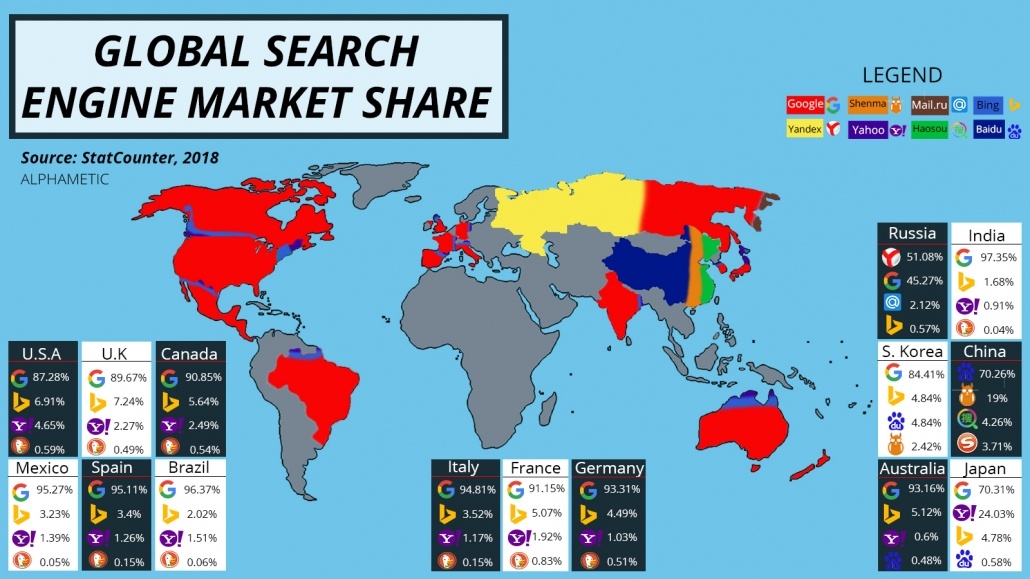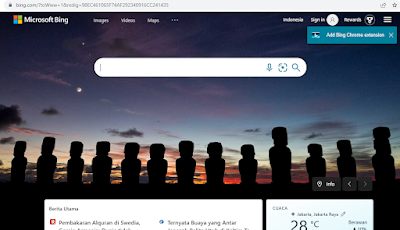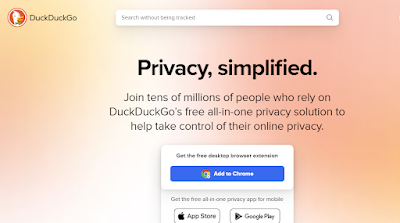In 2023, use one of these 11 alternative search engines.
When we discuss SEO and search engines, Search site Google comes to mind immediately. But did you know there are several substitute search engines available with comparable features?
Google is a well-known brand and a leader in the field; in fact, one research claims that Google Images is the second-largest "search engine":
There are other options, even if it's the biggest and most well-known.
As Google is known to collect user data for its own and third-party uses, one of the primary reasons individuals opt to use an alternate search engine instead is for more privacy.
Check out some of the other search engines if you've only ever used Google; you might find one you like more.
Alternative Search Engines: Our Guide
Before we get started considering alternatives, consider the following questions about what you would genuinely like from a search engine:
- What alternative search engines to Google are the best?
- The safest search engine is...
- Which search engine offers the most privacy?
- What is the best search engine?
Other Search Engines Besides Google
Check out this list of search engines you may use instead of Google, which includes both well-known and lesser-known options:
1. Bing
The second-largest search engine after Google is Microsoft's Bing.
It offers a more visual experience with lovely daily backdrop photographs and is simple to use. Bing is excellent for video searches since it presents the results as sizable thumbnails that can be hovered over to hear a sound preview.
Similar to Google, Search site Bing is packed with internal tools like currency conversion, translation, and flight monitoring, making it a truly adaptable tool that competes successfully on a worldwide scale. Please read our comprehensive guide to Bing Webmaster Tools.
Even while Bing is probably already recognizable to you, you might not be aware that it has a Rewards program. By using Bing to search or shop, you may earn points that can be used to buy applications and movies.
2. DuckDuckGo
For people who respect their privacy and are offended by the idea of having every search they do watched and recorded, DuckDuckGo is a well-liked search engine.
The user experience is excellent and streamlined because of the app's extremely clean UI, few advertisements, and endless scrolling. There is no user tracking at all, and you can even use DuckDuckGo's browser plugin to protect your privacy.
Bangs, a function of the search engine that allows you to search straight into another page from DuckDuckGo by inputting a prefix, is quite helpful. For instance, entering "!ebay magic the gathering" would bring you to the "magic the gathering" search results on eBay.
3. Yahoo!
Even though some consider Yahoo to be out of date, it has been operating for longer than Google and is still the third most used search engine globally. Even Firefox uses it as its default search engine.
Search site Yahoo is much more than simply a search engine, which is one of its outstanding features. Yahoo's web portal provides a variety of services in one location, including email, news, online shopping, gaming, and more.
Because of its combination with Flickr, Yahoo Answers, and Yahoo Finance, it provides superior image results and a wealth of data on a variety of subjects.
4. Ask
Ask's straightforward question-and-answer structure, formerly known as Ask Jeeves, enables searches in plain language. Because of this, it is incredibly user-friendly, particularly for people who are less accustomed to search engines, such senior computer users.
Additionally, similar commonly Search site asked questions are included in the search results, which might be helpful information and aid in your search.
5. Baidu
With a market share of more than 70% in China's internet market, Baidu is the most popular search engine there. It's in Mandarin, yet it looks remarkably like Google. It has a similar design, makes money from advertisements, and employs rich snippets in search results.
But Baidu is severely restricted. On the search engine, specific photos and even pro-democracy websites are prohibited.
6. WormAlpha
You may "calculate expert-level responses utilizing Search site Wolfram's breakthrough algorithms, knowledgebase, and AI technologies" using the privately held search engine WolframAlpha.
It is divided into sections on mathematics, science and technology, society and culture, and everyday life and is intended to give professional information. You may compute data, investigate statistics, and discover knowledgeable solutions to your queries using the different subcategories and helpful tools found inside these (you'll see an example in a moment).
In addition to providing a wealth of professional information, WolframAlpha offers privacy assurance by not tracking your search activity.
7. Boardreader
A forum and message board search engine is called Boardreader. You may use it to search forums and then narrow down the results by language and date.
It's a helpful tool for conducting content research since it makes it simple to locate information on the topic authored by actual people. Boardreader is an excellent place to start if you don't know the specialty well enough to determine which forum is the best to visit.
8. StartPage
StartPage was established with tight user privacy as its heart, similar to DuckDuckGo. Your data is not tracked or stored by it. Additionally, it doesn't target advertising depending on how you browse.
The "most private search engine in the world," according to Startpage Similar outcomes to those from a totally private Google search will be available to you.
Startpage is a search engine as well as a proxy service that enables anonymous website browsing for increased online security. Even without the need to set cookies, you may browse thanks to their unique URL generator.
All of data is shown in a slick, clean interface that can be customized with several themes, including Night Mode, for an incredibly functional user experience.
9. Ecosia
There is a correlation between high search engine utilization and CO2 emissions. Ecosia, a CO2 neutral alternative search engine, steps in to help with it.
The cash gained from each search (powered by Bing) goes toward its tree-planting program. To create one tree, on average, 45 searches are required.
10. Qwant
Qwant, a privacy-focused search engine founded in France, won't record your queries or use your personal information for advertising.
There is also a special music area that employs AI to help you search for lyrics and find new songs. The user-friendly design divides your search results into web, news, and social categories.
It makes advantage of a quick-search feature where you may type "&" before a website's name (or a specific shortcode) to get the results of an external search right away. For instance, "&w" or "&wikipedia" let you instantly get Wikipedia results from Qwant.
11. Search Encrypt
Search Encrypt is another privacy-focused search engine that makes use of local encryption to prevent the tracking of users' personal information.
Search Encrypt, a metasearch engine, obtains its results from a network of search partners, giving you comprehensive results that aren't tailored to your past activities.
The fact that this search engine immediately deletes your local browser history after 15 minutes of inactivity is a truly intriguing feature. This means that even if someone else has access to your computer, you never have to worry about maintaining your privacy.















0 Comments